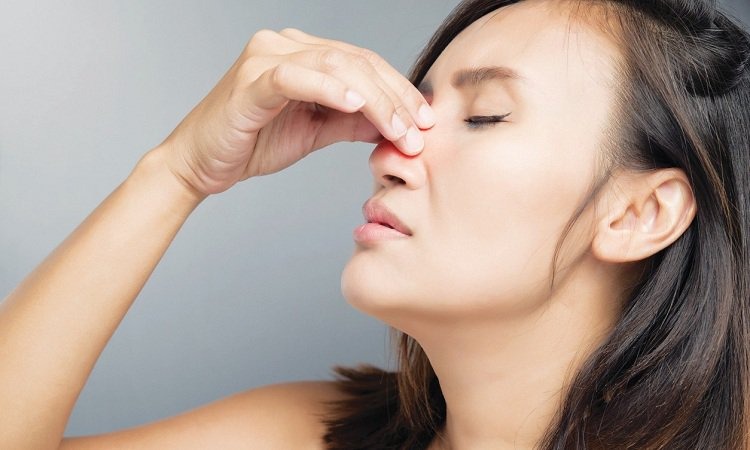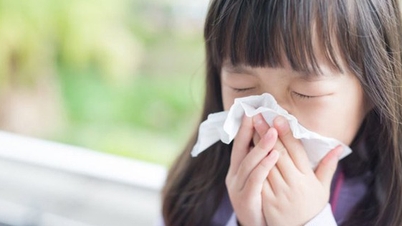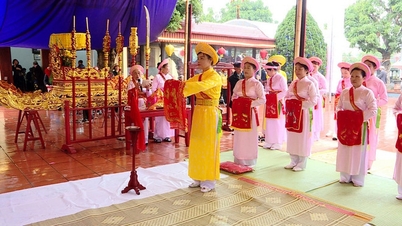Waking up in the middle of the night due to running water from eyes and nose, days of constant sneezing, nasal congestion, difficulty breathing, itchy eyes, swollen eyes… these are the nightmares of people with allergic rhinitis.
At 5 a.m., Ms. LPM (38 years old, Phu Nhuan District) woke up with tears and a runny nose, sneezing continuously, a stuffy nose, a cold sensation in her nose, and a red tip.
While working in the office, around 3-4 PM, she would sneeze continuously, have watery eyes and a runny nose, red eyes, and a stuffy nose, which reduced her work efficiency and affected her colleagues. The stuffy nose made it difficult for her to breathe, forcing her to breathe through her mouth, which also led to a sore throat.
 |
| Without proper treatment, the disease can become prolonged and worsen, causing complications such as acute and chronic sinusitis, nasal polyps; and at the same time, incurring significant costs, financial burdens, and a decline in quality of life. |
This condition lasted for nearly two weeks, leaving her exhausted, unable to concentrate, and drained of energy. "I experienced prolonged stress, anxiety, and even periods of depression because this illness has been with me for 20 years," Ms. M said.
Ms. M. suffers from chronic allergic rhinitis. This time, her symptoms recurred during a bout of stomach pain, while she was taking prescribed medication. Each time her allergic rhinitis symptoms flared up, she took medication to alleviate them, but this time the symptoms didn't improve, so she went to the Ear, Nose, and Throat Center at Tam Anh General Hospital in Ho Chi Minh City for examination.
Mr. DH (40 years old, a Vietnamese-American) suffers from pollen allergy. “This year, my allergy is more severe because there is more pollen than in previous years. I take medication and see my family doctor, but I still haven't recovered,” Mr. H. said.
Mr. H. said that every time the seasons change or during the "flower blooming season," he suffers from severe allergic rhinitis, and he limits his time outdoors to avoid pollen exposure. He cannot concentrate on his work, and his work efficiency decreases.
He had watery eyes and a runny nose; itchy eyes; swollen eyelids; constant sneezing; wheezing, nasal congestion, and a cough. He took medication to relieve the symptoms, but he felt lethargic and tired. This condition lasted for more than a month.
"Allergic rhinitis is a congenital condition with a hereditary component. Treatment for allergic rhinitis aims to reduce symptoms, limit recurrence, prevent complications, and improve the quality of life for patients, not to cure the disease completely," said Dr. Nhu Duy.
As for Ms. M, Dr. Duy performed a mucus suction procedure, ear, nose, and throat endoscopy, and prescribed antihistamines, eye drops, and nasal spray to reduce itching and discomfort. At her follow-up appointment two weeks later, her nasal congestion, sneezing, and stuffy nose had significantly improved.
According to the American Academy of Allergy, Asthma and Immunology (AAAAI), approximately 10-30% of the world's population suffers from allergic rhinitis. Epidemiological studies show that the prevalence of respiratory allergies is 15–30%, with the incidence of allergic rhinitis increasing over time, and sensitivity being higher in urban areas than in rural areas.
According to Doctor Nhu Duy, the disease also depends on many external factors such as environmental pollution, weather changes, and working environment. People with easily irritated constitutions should proactively strengthen their immunity and protect their bodies from allergens.
Allergic rhinitis is caused by the body's reaction to allergens such as dust, pollen, chemicals, cotton, fabrics, fibers, pet dander, parasites, smoke; certain foods (shrimp, crab, snails, etc.) or weather changes (sudden cold, heat, humidity). Patients experience a burning sensation in the nose, frequent sneezing, nasal itching, burning eyes, red eyes, watery eyes, excessive runny nose (like watery discharge), and a burning sensation in the pharynx.
Symptoms appear frequently during the day, especially in the early morning after waking up, but subside at night and last for a few days to a few weeks. When the disease becomes chronic, patients experience almost constant nasal congestion, tinnitus, headaches, olfactory disturbances, snoring, mouth breathing leading to pharyngitis, bronchitis, bronchial allergies, and very possibly asthma.
The disease is not life-threatening, but it causes significant discomfort, reduces the patient's quality of life, and affects their work, study, and daily activities. Many cases develop anxiety disorders and depression due to the discomfort of the disease.
"Many patients are allergic to rice, or tofu – it sounds strange, but it still happens," Dr. Duy said. Some patients who want to know exactly which substance is causing their allergy can get tested for 60 allergens.
This test uses 60 available allergen samples to identify the cause of allergies in the body, thereby helping patients prevent and limit exposure to allergens, and reduce disease recurrence.
According to Dr. Nguyen Nhu Duy, a specialist in Otolaryngology at the Ear, Nose, and Throat Center of Tam Anh General Hospital in Ho Chi Minh City, the hospital frequently receives many overseas Vietnamese returning to Vietnam for examination due to severe pollen allergies they experienced abroad; each flowering season is a nightmare for them.
Patients who are aware of their pollen allergy should take advantage of their trip back home to have a check-up to examine their nasal and throat health and see if they have any other nasal and throat conditions besides allergies. This is because some patients suffer from chronic allergic rhinitis for many years, leading to degeneration and edema of the nasal mucosa and hypertrophy of the turbinates.
If the doctor detects nasal polyps or anatomical abnormalities such as a deviated septum that worsen allergic rhinitis, they will consider surgery.
In Mr. H.'s case, Dr. Nhu Duy performed an endoscopic examination of the ear, nose, and throat and found no anatomical abnormalities in the nasal and throat structure. This was also not a recurrence of allergic rhinitis for Mr. H., so the doctor advised and guided him on how to care for his nose and throat, lifestyle, and nutrition to prevent allergic rhinitis recurrence as much as possible when he returns to the US, and to reduce pollen allergy symptoms.
Dr. Duy advises that for people with allergic rhinitis, when symptoms recur, they should rinse their noses with saline solution 1-2 times a day and take allergy medication; if there is a lot of mucus in the nose, they should irrigate their noses. If symptoms do not improve after 5-7 days of taking medication and cleaning the nose and throat, they should see an ENT specialist; note that they should not overuse vasoconstrictor nasal drops for immediate relief of nasal congestion.
If allergic rhinitis symptoms flare up significantly, you should see a doctor immediately; at the same time, strengthen your immune system, eat and rest properly , avoid stress, and do light exercise. If allergic rhinitis becomes infected (has developed bacterial infection), the patient must take antibiotics and antigens as prescribed by the doctor.
Without proper treatment, the disease can become prolonged and worsen, causing complications such as acute and chronic sinusitis, nasal polyps; and at the same time, incurring significant costs, financial burdens, and a decline in quality of life.
Dr. Duy advises that people with allergic rhinitis should avoid contact with allergens. If you are allergic to pollen, limit going outside when pollen levels are high (5 am – 10 am), keep windows closed, and consider using an air purifier.
Regularly clean your house, keep it dry, wear a mask when going outside, avoid dusty places, and limit contact with pets if you are allergic to pet dander. Clean your ears, nose, and throat daily, eat a healthy diet, avoid alcohol, exercise regularly to boost your immune system, get enough sleep (7-8 hours/night), and avoid stress.
Source: https://baodautu.vn/am-anh-viem-mui-di-ung-d220731.html





![[Photo] Prime Minister Pham Minh Chinh presides over the regular Government meeting in February.](https://vphoto.vietnam.vn/thumb/1200x675/vietnam/resource/IMAGE/2026/03/04/1772606688233_ndo_br_42i9852-jpg.webp)

![[Photo] General Secretary To Lam presides over a meeting with the Editorial Teams to summarize 100 years of the Party's leadership of the Vietnamese revolution and 40 years of implementing the National Construction Program.](https://vphoto.vietnam.vn/thumb/1200x675/vietnam/resource/IMAGE/2026/03/04/1772601288977_a1-bnd-8134-7576-jpg.webp)








































































































Comment (0)